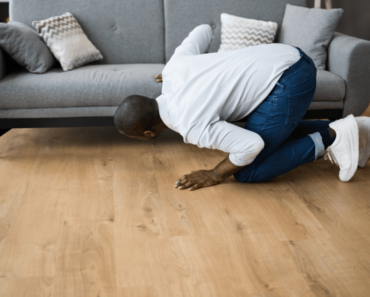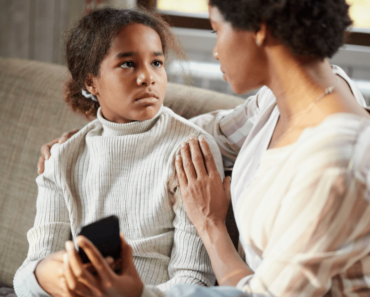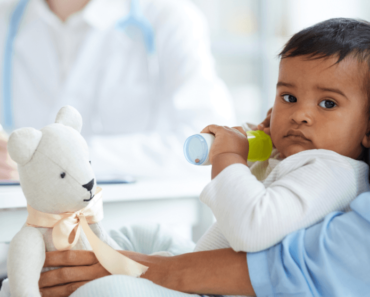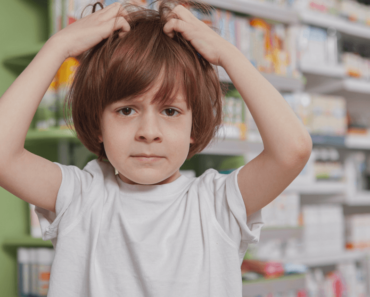Coughs, congestion, sore throats, fevers—viruses seem to be everywhere right now, and it’s not just COVID. Cases of respiratory syncytial virus (RSV), influenza and other viruses are rampant, and a critical shortage of paediatric fever reducers like ibuprofen and acetaminophen means parents don’t necessarily have the tools to deal with them. Here’s what’s currently happening in Canadian hospitals, and what parents can do to keep their kids healthy this winter and help ease the burden on the healthcare system.
Why are children’s hospitals under so much stress at the moment?
There are a ton of viruses circulating in communities right now, including the common cold, but it’s the “tripledemic” of RSV, influenza and COVID-19 that are making kids sick enough to require hospitalization, says Dr. Joe Oliver, a paediatrician in Hamilton, Ontario. In terms of which virus is affecting kids the most, it’s hard to measure, particularly as a lot of kids actually have multiple viral infections, due to a weakened immune system.
“We’re seeing a really unprecedented surge of patients, both those who are coming to the paediatric ER and going home but also those who are coming to the hospital through the paediatric ER and have to be admitted,” adds Dr. Christopher Sulowski, chief of the paediatric emergency department at McMaster Children’s Hospital (MCH) in Hamilton, Ontario. “It’s not just a wait time problem, it’s a whole-system-being-overwhelmed problem.”
In late November, MCH was at 154% capacity, an all-time high with average ER wait time reaching 12 hours (up from three to four hours this time last year). Emergency care is triaged, so it’s not first come, first served—meaning, some patients are bumped back as sicker kids are brought in for care (though, you can ask to be re-triaged if your child’s condition changes while you wait). It’s a desperate situation, and it’s not just happening in Hamilton—as Solowski notes, similar scenarios are playing out at many children’s hospitals across the country.
How can parents tell if their child has RSV, the flu or COVID?
Unfortunately, parents might not be able to differentiate which virus their child has without medical testing (for example, an antigen test that uses a throat or nasal swab). There is a lot of overlap between the symptoms of influenza and COVID-19, and a mild case of RSV presents similarly to the common cold while a more severe case may resemble COVID or the flu. Because more than one virus can be present at the same time, lab testing is the only way to confirm the source of their illness.
So, do you need to know the exact cause of the hacking cough, or should you simply treat your child’s symptoms while staying home to avoid spreading illness to others? “I wouldn’t get hung up on needing to know [which specific virus they have],” Oliver says. “Instead, I’d encourage parents to be on the lookout for signs that indicate their kid needs to go to the hospital—a fever that goes on for four to five days, having a hard time breathing, being difficult to rouse and, more than anything, your parent-radar going off.”
Oliver shares that there are specific antiviral treatments kids may benefit from if they have the flu, which is why testing is often done upon hospitalization. Furthermore, parents may want to test for COVID at home to avoid spreading it to vulnerable contacts like grandparents or immunocompromised people. In most cases, it’s most important to treat your child’s symptoms while doing everything in your power to avoid spreading any and all viruses they have to others.
So, when should parents head to the ER?
Sulowski acknowledges that a fever can make parents anxious—especially if you’re talking about a toddler who’s never been sick before—but says you don’t necessarily need to race to the emergency room. Here are some recommendations to help you make the call.
Go to emerg if:
Try treating at home first if:
- Your child is drinking fluids and urinating normally
- Your child lacks energy, is sleeping a lot and wants to be held, but can focus on you when you’re speaking to them
- The fever—even a high fever—has only been present for a short time (less than a day or two)
Parents can give their kids fever reducers at home, assuming they can access these in-demand medications (don’t forget—they may be stocked behind the pharmacy counter!) but they won’t necessarily get rid of the fever completely, and that’s OK. “We don’t want to tell families they need Tylenol or Advil to break the fever,” Sulowski says. “The goal is to keep them comfortable.”
It’s not the number on the thermometer ER docs look at, Sulowski says, but the duration of the fever, which is the body’s way of fighting infection. “I care more about a low-grade fever that’s been rumbling for six or seven days than a high fever that’s been there for two hours,” he says.
Is COVID-19 less of a concern than it used to be?
With so much talk of RSV and influenza in the news, it feels like COVID-19 seems to have taken a back seat in the conversation—but should it? Definitely not, Oliver says. “It’s being painted as less of a concern through misinformation, and probably from our collective need to not have to deal with this thing anymore, but it’s still a concern.”
It’s more difficult to measure levels of COVID in the community now that the government is no longer tracking cases or sharing data, he says, but the evidence of significant infection levels is there. “It’s in schools, it’s in the community, and we don’t know the long-term impact of COVID on kids. That’s not fear-mongering, it’s just what it is—and it’s serious.”
That said, COVID alone isn’t driving hospitalizations or responsible for the immense pressure on the healthcare system—it’s the combined effect of several viruses plus a longstanding lack of resources that predates the pandemic.
Can I give my child adult fever reducers if I cannot access paediatric medication?
While this isn’t ideal, paediatricians like Oliver understand that it’s happening anyway, so it’s important to manage your risk. Ontario Poison Control recently put out detailed safety guidelines for using adult fever reducers to treat sick children.
To treat a fever at home, Sulowski suggests you start by removing a layer or two of clothing and/or blankets. If your child is shivering, add back one layer. “Shivering means you’ve gone too far and will actually increase their internal temperature,” he says. Offer cool fluids and popsicles, focusing on comfort and hydration. Make plans to stay home and isolate regardless of which virus your child may have.
How can I prevent my kids from getting sick or spreading viruses?
Oliver knows that a lot of parents don’t want to hear this answer, but it’s the truth: wearing a mask in congregate settings and indoor public spaces is critical right now. This includes school, the grocery store, the movie theatre, and certainly at a doctor’s office. Scientific data proves that wearing a mask minimizes the spread of COVID and other viruses, and they’re the quickest way to reduce illness in the community. An N95 or KN95 mask is ideal (even if it hasn’t been fit-tested) but any mask is better than none.
Sulowski feels that we’re gradually coming out of the COVID-19 pandemic, but agrees that this is not the right time to drop masks altogether. “As we’re coming out of it, some element of masking and social isolation is required as we get back to normal. We can’t jump back to normal right away, at least not this winter season.”
Vaccines remain one of our strongest defenses against COVID and influenza, Oliver and Sulowski agree, but they take a few days to a few weeks to reach optimal protection, so other forms of risk management are key. (RSV vaccines aren’t available quite yet.) That said, Oliver insists that “vaccines are not a panacea—we still need masks.”
Isolation when sick is a critical factor, but Oliver acknowledges that keeping kids home is “absolutely a matter of privilege and community support,” and not an option for every family.
If your kids are resistant to masking, take a gentle approach, Oliver suggests. Help them mask effectively by modelling the behaviour yourself and appealing to their emotions. If your kid finds wearing a mask uncomfortable or annoying, validate that feeling while explaining the benefit. “By validating, you’ll create a space where your kid feels heard.”
“We really need better communication,” Oliver says, explaining that if people really knew what was going on in hospitals right now or could see those sick children for themselves, they’d be more than willing to take preventative measures.
Is there a way families can support healthcare workers during this crisis?
“We’re past banging pots and pans,” Oliver says. Beyond masking and conscientiousness, says Oliver, “put pressure on people in positions of power to do the right thing with the science they have access to.” Many parents send their kids to school sick because they can’t afford the time off from work. By addressing these needs—for example, by fighting for a living wage and paid sick days in addition to better air quality in schools—we can make public health guidance more accessible.
“First and foremost, we want all parents to know we’re here for them and we’re seeing children as quickly and safely as we can,” Sulowski says. “When they come to us at the paediatric ER, we want them to be prepared that there’s a long wait.” He suggests bringing snacks, distractions like a tablet and chargers for any devices.
“We know it’s a stressful time when kids are sick and sometimes that stress boils over, but some of these factors are outside of your healthcare team’s responsibilities. If the hospital is full, we’re working on clearing up space and clearing up beds. We’re having meetings about that constantly. We’re not happy with those wait times but it’s the reality of the situation we’re in right now.”
OK, so… is this our new normal?
The last three years have been really hard on a lot of families, and no one wants the COVID pandemic, or this so-called tripledemic, to last forever. Still, what happens in the future depends on what we do now. “This could stay our new normal,” Oliver cautions, referencing several instances where those in power chose convenience over science. “Or, this could be a stepping stone to a better, newer normal where we have a jump on this stuff.”
“We would have cholera all the time if we didn’t start cleaning our water. The same comparison can be made with seatbelts,” Oliver says. “This will be our normal until we decide that it sucks being sick over and over, and it’s nice not being infected all the time—we don’t have to keep getting infected with things that are uncomfortable. We have the option to have a better normal.”
Here’s hoping we take it.

































